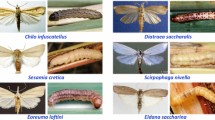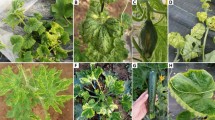Abstract
Pepper mild mottle virus (PMMoV), a Tobamovirus from Virgaviridae family, is highly contagious and transmitted by seeds as well as soil in nature. PMMoV has become a greater threat to capsicum cultivation worldwide. To develop an indigenous, rapid, and sensitive protocol for routine detection of PMMoV from seeds, the sensitivity of DAS-ELISA and RT-PCR was compared in the present study. The infected seeds of California Wonder were included in the study. Through DAS-ELISA the virus was successfully detected from 20 mg of seeds. However, using RT-PCR, we were able to detect the virus even from one infected seed with reproducibility. In the present study, vertical seed transmission of the test virus was investigated by employing a grow-out test under greenhouse conditions as well as directly through RT-PCR omitting the grow-out test in three capsicum cultivars. Based on symptoms observations in grow out test, seed transmission was observed in the 3 capsicum cultivars viz., California Wonder (63.04%), Yolo Wonder (33.80%) and Doux des LAndes (33.30%). Through RT-PCR it was estimated to be 55.56% (California Wonder), 28.96% (Yolo Wonder), and 40.64% (Doux des Landes), respectively. Thus, indicating 100% seed-to-seedling PMMoV transmission and reliability of RT-PCR in direct PMMoV detection from seeds. Even a small percentage of infected seed has the potential to greatly increase the PMMoV inoculum in the field and result in 100% plant infection. Therefore, we suggest using the established procedure for PMMoV detection right from the seed.


Similar content being viewed by others
References
Alonso E, Garcia Luque I, Avila-Rincon MJ, Wicke B, Serra MT, Díaz-Ruiz JR. A tobamovirus causing heavy losses in protected pepper crops in Spain. J Phytopathol. 1989;125(1):67–76.
Al-wabli A, Khattab EAH, Farag AG. Biological, serological and molecular characterization of pepper mild mottle virus isolated from west region of kingdom of Saudi Arabia. Res J Infect Dis. 2017;5:1.
Aranda MA, Freitas-Astua J. Ecology and diversity of plant viruses, and epidemiology of plant virus-induced diseases. Ann Appl Biol. 2017;171:1–4.
Avgelis AD. A pepper strain of TMV who is new in Crete (Greece). Phytopathol Mediterr. 1986;25:33–8.
Balique F, Lecoq H, Raoult D, Colson P. Can plant viruses cross the kingdom border and be pathogenic to humans? Viruses. 2015;7(4):2074–98.
Brunt AA, Crabtree K, Dallwitz MJ, Gibbs AJ, Watson L. Viruses of plants: descriptions and lists from the vide database. Cambridge: Cab International, University Press; 1996. p. 947–9.
Candemir F, Kutluk-Yilmaz ND, Gulser C. The effect of tobacco waste application on Tobacco mosaic virus (TMV) concentration in the soil. Zemdirb Agric. 2012;99(1):99–104.
Colson P, Richet H, Desnues C, Balique F, Moal V, Grob JJ, Berbis P, Lecoq H, Harle JR, Berland Y, Raoult D. Pepper mild mottle virus, a plant virus associated with specific immune responses, fever, abdominal pains and pruritus in humans. PLoS ONE. 2010;5(4):e10041.
Crowley NC. Studies on the seed transmission of plant virus diseases. Aust J Biol Sci. 1957;10:449–64.
Dombrovsky A, Smith E. Seed transmission of Tobamoviruses: aspects of global disease distribution. Adv Seed Biol. 2017; 233–60.
Domeir LL, Hobbs HA, McCoppin NK, Bowen CR, Steinlage TA, Chang S, Wang Y, Hartman GL. Multiple loci condition seed transmission of Soybean mosaic virus (SMV) and SMV-induced seed coat mottling in soybean. Phytopathology. 2011;101(6):750–6.
Eiras M, Chaves ALR, Moreira SR, Araujo J, Colariccio A. Characterization of a non-L3 gene-resistance breaking Pepper mild mottle virus isolate in Capsicum. Fitopatol Bras. 2004;29:670–5.
Gumus M, Paylan IC. Detection of viruses in seeds of some vegetables by reverse transcriptase polymerase chain reaction (RT-PCR). Afr J Biotechnol. 2013;12(25):3891–7.
Jarret RL, Gillaspie AG, Barkley NA, Pinnow DL. The occurrence and control of Pepper mild mottle virus (PMMoV) in the USDA/ARS capsicum germplasm collection. Seed Technol. 2008;30:26–36.
Johansen E, Edwards MC, Hampton RO. Seed transmission of viruses: current perspectives. Annu Rev Phytopathol. 1994;32(1):363–86.
Kenyon L, Kumar S, Tsai WS, Hughes JD. Virus diseases of peppers (Capsicum spp.) and their control. Adv Virus Res. 2014;90:297–354.
Kirita M, Akutsu K, Watanabe Y, Tsuda S. Nucleotide sequence of the Japanese isolate of Pepper mild mottle tobamovirus (TMV-P) RNA. Ann Phytopathol Soc Japan. 1997;63(5):373–6.
Kumar S, Udaya Shankar AC, Nayaka SC, Lund OS, Prakash HS. Detection of Tobacco mosaic virus and Tomato mosaic virus in pepper and tomato by multiplex RT–PCR. Lett Appl Microbiol. 2011;53(3):359–63.
Lee BY, Lim HR, Choi JY, Ryu KH. Development of molecular detection of three species of seed-transmissible viruses useful for plant quarantine. Plant Pathol J. 2004;20(4):302–7.
Martinez-Ochoa N, Langston DB, Mullis SW, Flanders JT. First report of pepper mild mottle virus in jalapeno pepper in Georgia. Plant Health Prog. 2003;4(1):26.
Moury B, Verdin E. Viruses of pepper crops in the Mediterranean basin: a remarkable stasis. Adv Virus Res. 2012;84:127–62.
Nienhaus F. Lehrbuch der Phytomedizin. Hamburg: Verlag Paul Parey; 1976.
Pernezny K, Roberts PD, Murphy JF, Goldberg NP, editors. Compendium of pepper diseases. APS Press; 2003.
Rialch N, Sharma V, Sharma A, Sharma PN. Characterization and complete nucleotide sequencing of Pepper mild mottle virus infecting bell pepper in India. Phytoparasitica. 2015;43(3):327–37.
Sakamoto I, Matsuo A. Seed transmission of TMV in pepper. Bull Hyogo Pref Agric Exp Stn. 1972;20:93–6.
Sastry KS. Seed-borne plant virus diseases. Springer Science & Business Media; 2013.
Sevik MA, Kose-Tohumcu E. The ELISA analysis results in tomato (Lycopersicon esculentum Mill.) seed health testing for Tobacco mosaic virus. Zemdirb Agric. 2011;98(3):301–6.
Simmons HE, Munkvold GP. Seed transmission in the Potyviridae. In: Global perspectives on the health of seeds and plant propagation material. Dordrech: Springer; 2014. p. 3–15.
Tanzi M, Betti L, Canova A. PepMV transmission through the pepper seed: its involvement in the pathogenical behaviour. Phytopathol Mediterr. 1990;29(2):122–3.
Torre C, Aguero J, Gomez-Aix C, Aranda MA. Comparison of DAS-ELISA and qRT-PCR for the detection of cucurbit viruses in seeds. Ann Appl Biol. 2019;176(2):158–69.
Tosic M, Sutic D, Pesic Z. Transmission of Tobacco mosaic virus through pepper (Capsicum annuum L.) seed. Phytopathologische Z. 1980;97(1):10–3.
Wetter C, Conti M. Pepper mild mottle virus. CMI/AAB descriptions of plant viruses, 1988.
Zhang Y, Zhao W, Li M, Chen H, Zhu S, Fan Z. Real-time TaqMan RT-PCR for detection of maize chlorotic mottle virus in maize seeds. J Virol Methods. 2011;171(1):292–4.
Acknowledgements
The corresponding author is grateful to Indian Council of Agril. Research, New Delhi (ICAR 017-17 NSP-Seeds) and UGC, Govt of India for financial assistance (award letter no.43-3/2014-SR).
Author information
Authors and Affiliations
Corresponding author
Ethics declarations
Conflict of interest
All authors declare that they have no conflict of interest.
Additional information
Publisher's Note
Springer Nature remains neutral with regard to jurisdictional claims in published maps and institutional affiliations.
Supplementary Information
Below is the link to the electronic supplementary material.
Rights and permissions
Springer Nature or its licensor (e.g. a society or other partner) holds exclusive rights to this article under a publishing agreement with the author(s) or other rightsholder(s); author self-archiving of the accepted manuscript version of this article is solely governed by the terms of such publishing agreement and applicable law.
About this article
Cite this article
Patel, P., Kumari, N. & Sharma, P.N. RT-PCR based detection of Pepper mild mottle virus from capsicum seeds and seed transmission assay. VirusDis. 34, 50–55 (2023). https://doi.org/10.1007/s13337-023-00807-0
Received:
Accepted:
Published:
Issue Date:
DOI: https://doi.org/10.1007/s13337-023-00807-0




